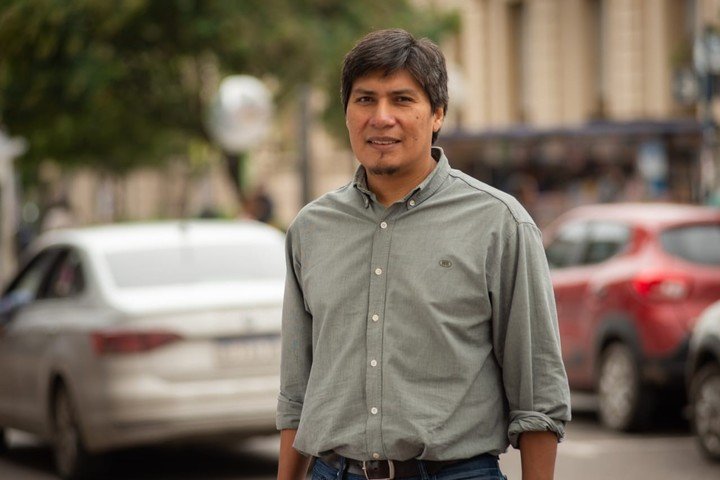In Argentina’s primary elections on Sunday, the Workers’ Left Front – Unity (FIT-U), an electoral coalition of four Trotskyist parties, had its best elections yet. The coalition — composed of the Party of Socialist Workers (PTS), Left Voice’s sister organization; the Workers’ Party (PO); Socialist Lift (IS), and the Workers’ Socialist Movement (MST) — is now the third-largest electoral force in the country. PTS member Alejandro Vilca earned 24 percent of the votes in the province of Jujuy, a northern province that’s home to tens of thousands of indigenous people and farm workers. If Vilca’s performance in the November elections is comparable to Sunday’s results, he could win a seat in the National Congress.
Kolla, Harvesting Worker, and Revolutionary Militant
Workers in the province of Jujuy were represented not only by the ideas that Vilca put forward during the campaign, but by his own life story, which resembles that of many in Jujuy. Like many residents of Jujuy, he is a member of the Kolla indigenous community and was born into a poor, working-class family. Along with his four siblings, he was raised by a single mother who worked as a maid in a private sanatorium in the province’s capital, San Salvador de Jujuy.
Alejandro Vilca went to high school during the tumultuous early 90s, when state workers were at the forefront of class struggle in Jujuy. After high school, he worked hard to be able to study architecture in the western province of San Juan. There, he participated in the struggle against the educational reforms of the government of Carlos Menem and joined “En Clave Roja,” the PTS’s student group. Vilca was already a militant in the PTS during the mid-1990s when workers who had lost their jobs as a result of privatization and neoliberalism protested the governments with widespread roadblocks.
A decade later, as a precarious municipal worker, he was part of the Provincial Coordinating Committee of Workers in Black and helped organize thousands of other precarious workers in health care, education, and other state departments. Because of his participation in this struggle, the municipality transferred him and a group of activists to the most difficult and precarious sector of work: garbage collection in the popular Alto Comedero neighborhood, far from the largest concentrations of workers in the department.
Vilca has spent the last few years fighting for the rights of the most exploited workers in the area, such as in the tobacco, sugar, and farming industries. He has also fought for the rights of indigenous peoples and women, and against environmental destruction.
A Campaign from the Bottom Up
Vilca’s personal history and political proposals gave rise to intense militancy on the part of rural tobacco workers and citrus harvesters on farms and in neighborhoods. One of these proposals is a law to ensure that the families of rural workers do not lose their rights once the harvests end. The campaign also received enormous support from bus drivers, street vendors, state workers, teachers, healthcare workers, social movements, and the unemployed. Sectors of students and working-class youth also held meetings in support of the FIT-U.
Challenges
After Sunday’s elections, Alejandro Vilca reflected on the coalition’s goals and prospects for the future:
Our objective is to use the results of [these primary elections] to face the general elections and to reach more and more workers, women, youth, and indigenous peoples so that they organize themselves together with the left. The historic results leave us with good prospects for November to win a seat for the struggles of the working people. This great election is the result of the support, effort, and commitment of hundreds of workers from the most humble sectors of the whole province.
Vilca first ran for office in 2011 when the FIT-U was formed. He ran for governor and won 1.93 percent of the vote. In 2015, he ran for provincial deputy, earning 7.06 percent of the votes and nearly gaining a seat in the chamber. In 2017, he won 17.74 percent of the votes, helping the coalition win four seats in the provincial legislature and five councilors in the province’s main cities.
Since then, as a deputy in the Jujuy provincial legislature, Vilca has represented workers by proposing laws in their favor and denouncing the abuses of the right-wing provincial government of Gerardo Morales and his agreements with the Peronist block. He continues to take the same salary as a garbage collector and donates the rest of his position’s wages to social struggles. In this year’s primary campaign, he was the candidate who declared the fewest assets.
This is why in Sunday’s elections, the Left came in second in San Salvador de Jujuy, Palpalá, and Caimancito, winning its highest vote tallies in the capital’s working-class and popular neighborhoods. In total, the coalition got over 81,000 votes — 24 percent of all votes — and came in third place.
On the other hand, the right-wing Frente Cambia Jujuy party, helmed by Governor Gerardo Morales, won with 46.4 percent of the vote. That being said, it lost 20,000 votes compared to the provincial elections in June.
Peronism, united around President Fernández and Vice President Fernández de Kirchner’s Frente de Todos party, came in second place with 28.3 percent of the vote. The party did not achieve a definite advantage over the FIT-U, which was only 5 percent behind them and is now fighting for second place in the November general election.
As Alejandro pointed out during Sunday’s press conference, “This result is a message to the big businessmen who think they own the lives of the workers. It shows that the Left has been consolidating to raise a program of independence for workers and aiming at a real solution for our class.”
First published in Spanish on September 15 in La Izquierda Diario.
Translation by Otto Fors











